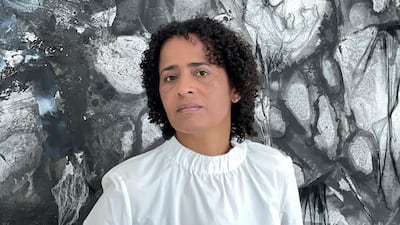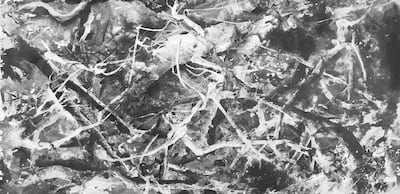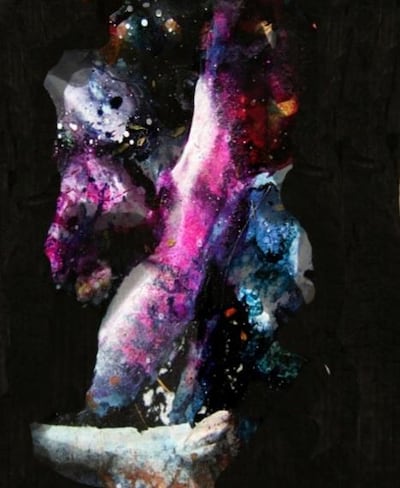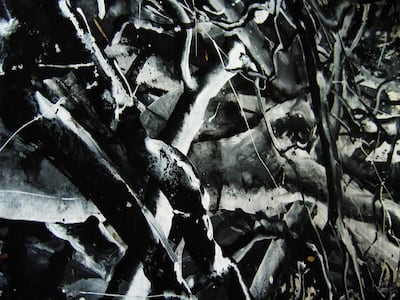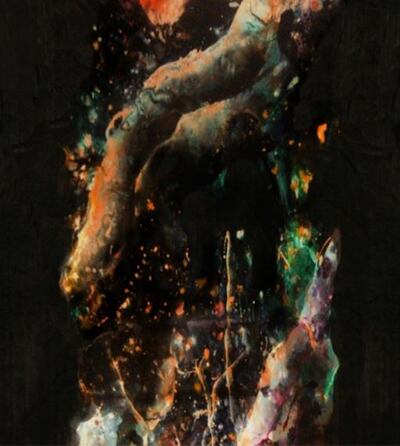With scrawling motions and layered intentions all across the canvas, it is easy to feel dizzied by any one of Aisha Juma’s paintings. A portion of the Emirati artist’s works are dominated by a whirl of vertiginous brushstrokes, limited to black and white hues. Then there are the pieces that feature swathes of empty spaces encroaching on vibrant splattered paints and watercolours.
The two types of paintings inhabit opposing polarities. So much so that it may even seem that they were created by two different painters. And in a way that is true, as Juma says the works have come from two different places within her.
“The paintings are a product of me reflecting on the masculine and feminine qualities within me; qualities that are present in each one of us,” Juma explains.
“The paintings are part of a long road of self-discovery, of meditation and therapy. I’d use only my left hand when painting from my female side, following my female energy. When painting from my inner masculinity, I’d paint only using my right hand and in black and white colours.”
The paintings will be exhibited during the Playing Light, Playing Dark musical performance at The Theatre at Mall of the Emirates on Saturday in commemoration of International Women's Day.
Juma says she was inspired by the meditation retreats she takes every year as a way for her to rekindle the connection to herself and her environment.
It all began in 2002, after she quit her job as an art teacher, seeking to understand the corrosion of creativity that seemed to grip her students as they grew older.
At that point, the Emirati artist had been teaching art across government schools in Dubai for 14 years since graduating from the College of Fine Arts at Helwan University in Cairo. Feeling disheartened by her former students' loss of interest in art, she decided to look for an alternative educational approach. Then, she discovered the Montessori Method.
Developed by Italian physician Maria Montessori in the early 1900s, the education method encourages psychological self-construction in children and developing adults via a mindful interaction with their environments. The method advocates independence, believing that if children are permitted to choose and act freely within an environment, they are more likely to experience optimal physical and psychological development.
“It’s about seeing life through the senses, recognising the information we process through sight, smell, sound, taste and touch,” Juma says. “It’s not just an education method, but a philosophy of being mindful of what we perceive.”
Soon after discovering the method, Juma enrolled in a Dubai centre to understand its intricacies, as well as to learn how to apply it in a classroom. She became so taken by the ideas of mindfulness behind the method that she soon found herself applying them to other aspects of her life, including her art practice.
“It’s found its way into everything I do,” she says. “It’s an interesting method in education and a beautiful way of looking at life.”
It also inspired her to start taking annual meditation excursions, travelling to India, Europe and South America. Sometimes she'd paint during her trips. Other times, she'd paint upon her return.
The paintings on display during the Playing Light, Playing Dark concert were all created as a by-product of these retreats. The idea to have the works in conversation with music, Juma says, came from Jordanian-Turkish pianist Tala Tutunji, who Juma had worked with years ago as art director at Al Jalila Cultural Centre for Children.
“She wanted to bring something new to her concert and so she thought to bring a visual artist into the fold,” Juma says. “When she invited me, I was totally open to the idea.”
Tutunji says she was taken by Juma's works because they seemed to reflect the "light and darkness of the inner self".
“The concept of the performance was developed as a collaboration between music and the visual arts,” Tutunji says. “It won’t be like a typical art gallery followed by a concert. It’s going to be an integrated experience. We’re going to have a musical performance, but it will also showcase different artworks by Juma.”
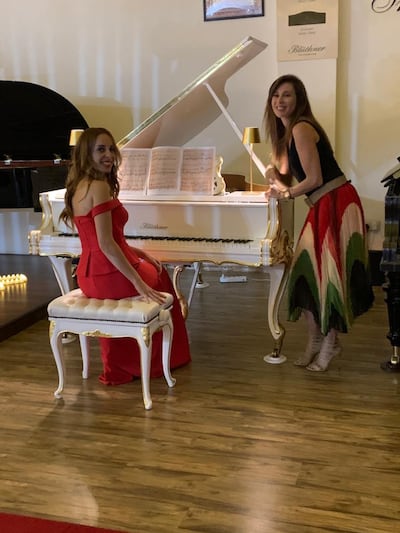
The setlist for the performance, Tutunji says, will blend compositions from western classical and Arabic music, as well as songs from musical theatre. Besides Tutunji, the performance will feature French-Lebanese singer Corinne Metni and Syrian guitarist Feras Rada.
Each song will mirror the emotions and energy of individual paintings by Juma, which will be projected on to the stage during the performance as well as on empty canvases in the space outside the venue.
“Some pieces will be lively and will reflect her lighter works, whereas other pieces will be quite dark and will be presented along with the dark paintings,” Tutunji explains.
The performance is a meeting point for three female artists from different cultures, making it an especially significant way of marking International Women’s Day, Tutunji adds.
The performance, Juma says, is also meant to commemorate the feminine qualities within each and every one of us, regardless of gender.
"It is nice that Feras [Rada] is joining us because we believe that feminine energy is not exclusive to women. Every human being has both sides, male and female, within them."
Tickets to Playing Light, Playing Dark are from Dh100 and can be purchased from dubai.platinumlist.net
